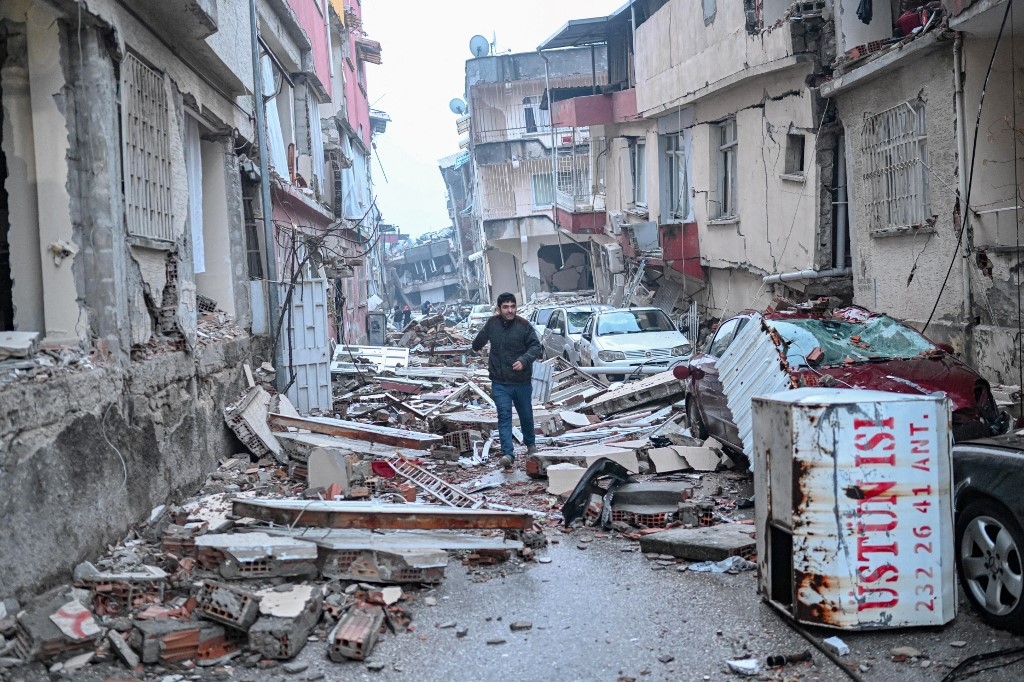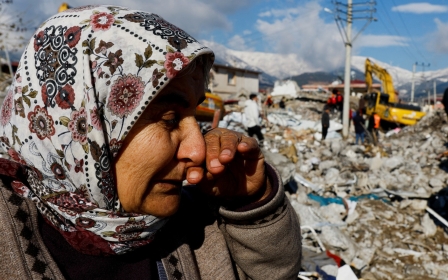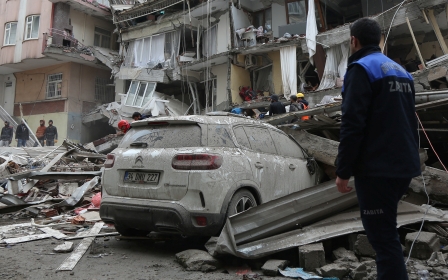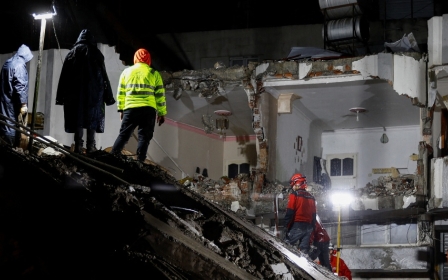'The earth cracked open': Survivors in Turkey recall earthquake terror

Twin earthquakes with epicentres in southeastern Turkey early on Monday morning have so far killed more than 5,000 people in Turkey and Syria, with the death toll expected to continue rising as emergency workers and volunteers search for survivors through the rubble of collapsed buildings.
Many more have been left homeless in freezing conditions by the disaster. Middle East Eye talked to two of those who survived the night with their families.
'I felt scared and helpless'
Burak Karacaoglu is a journalist working for Anadolu Agency based in Hatay.
We were asleep as the earthquake hit us. We were awakened by the tremor and the noise. Our apartment building was shaking like a crib.
New MEE newsletter: Jerusalem Dispatch
Sign up to get the latest insights and analysis on Israel-Palestine, alongside Turkey Unpacked and other MEE newsletters
My wife and I rushed to our two children. I don’t know how I thought about it but there was a place in the apartment where I figured we would be safer, and we all huddled there.
It was horrendous. You feel completely desperate in that moment. You can only live through it and wait.
I could only think about my wife and children. What else could I do?
We felt like the quake slowed down for a moment. But then a stronger tremor hit us, like the earth cracked open and there was a great rumble. This went on for a very long time.
Our house was badly damaged. The roof came down and the walls collapsed around us.
As the tremble ended, we rushed to the front door in the dark, feeling our way with our hands. But the door wouldn’t open because there was debris blocking it. We walked back towards the bedroom again in the dark, still unable to see as we searched for the back door leading to the stairs.
The quake had opened up a hole in the wall. I widened the hole using something I picked up, though I can't remember what it was exactly. I tried to pass my children through the hole onto the street. As I was doing so, our neighbours came to our aid. They took the children out and I was the last to leave the building.
We were finally out, standing in the street in our night clothes, and without shoes. It was raining and cold.
There were collapsed buildings around us. I was really scared and I felt totally helpless.
Somehow we managed to find some clothes for the children. Everyone was scrambling around, just trying to survive. IHH [the Turkish humanitarian aid organisation] has an aid centre in Hatay from where it distributes supplies to Syria, so we made our way there.
Am I bodily well? Yes - but I cannot say the same for my psychology and mental wellbeing.
Everyone is striving to stay alive. There are seriously damaged houses all around us. Ruined buildings. There were many people killed and injured in our neighbourhood.
Eventually we were guided to shelters determined to be safe by the Turkish disaster management agency, AFAD, such as gymnasiums and sites set up in the gardens of non-government organisations.
But the situation is still very bad.
'We were living only in that moment'
Yakup Alaca is an aid worker working for IHH, the Turkish humanitarian organisation, based in Kilis.
I have been working hard because the winter has been pretty harsh for people living in Syria. I was helping them. I didn’t think about anything else. I finished off my day and returned home to our flat.
My wife and I have a new baby. We spent the evening chatting and then we went to bed. Everything was normal and routine.
Then we were woken from our sleep by the tremor. It was very long, continuing for more than a minute.
I quickly grabbed my child. But we didn't know what to do because we were afraid of going out in case the house collapsed on top of us.
Instead, we went onto the balcony. I know it wasn’t very rational to go there. But you cannot think straight. My brain stopped working, as they say. We were living only in that moment.
We were on the ground floor of the building but the flat was above street level. I briefly thought of dropping my baby to the ground from the balcony so she could live. You lose sense of logic. You don’t know what you are thinking.
In the end, we just stayed there on the balcony, waiting.
The building continued to shake. Then it stopped.
We gathered ourselves together and started collecting our belongings. And then the tremor started again. I put the baby into the stroller and ran outside the building on bare feet. We waited outside and decided not to go back into the house.
I contacted the aid group I work for following the earthquake and I brought my family to the aid group’s coordination centre. Everyone else did the same. People were sheltering in shipping containers. Other survivors are taking refuge at mosques, funeral houses and gymnasiums.
But there are many people who are still on the streets. The weather is cold, do you understand?
You could only stand it for a night but after that?
At the centre where we are staying we can heat ourselves with electricity. But the ones staying in the streets are burning wood in barrels.
I’m a humanitarian aid worker. People are asking me everywhere, “Would you get us at least a cup of soup?”
They are also asking for blankets because it is very cold. They ask for food and covers. It is very hard. I don’t know what to say.
- Ragip Soylu contributed to this report.
Middle East Eye delivers independent and unrivalled coverage and analysis of the Middle East, North Africa and beyond. To learn more about republishing this content and the associated fees, please fill out this form. More about MEE can be found here.




